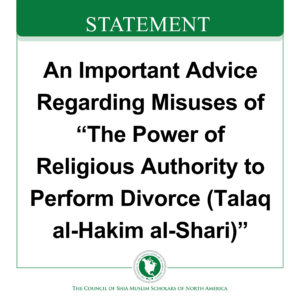In The Name of Allah The Beneficent The Merciful Announcement Concerning: The Crescent Moon of…
 An Important Advice Regarding Misuses of “The Power of Religious Authority to Perform Divorce (Talaq al-Hakim al-Shari)”
An Important Advice Regarding Misuses of “The Power of Religious Authority to Perform Divorce (Talaq al-Hakim al-Shari)”
نصائح وتنبيهات هامّة بخصوص "طلاق الحاكم الشّرعي"
Recently, there has been an increase in complaints made by many community members regarding incidents of misuse of the divorce by al-hakim al-shar‘i that are unbefitting of the religious code of conduct, which leads to disintegration of families and well-being of children, and the infringement of rights—all under a false premise of “divorce by the religious authority”—and without fear of incurring God’s anger. These incidents are occurring frequently, to the extent that a woman might marry another man under the assumption that she is divorced while she is still [legitimately] the wife of her first husband! Therefore, in order to uphold the religious and moral duty of preserving the sanctity of the community of believers and the need to draw attention to the importance of preserving honor, individual rights, and family ties, The Council of Shia Muslim Scholars caution and remind all believing women and men of the importance of collectively enjoining good and forbidding evil. Moreover, we stress to the believers that they need to take full precaution to avoid falling into the traps of pseudo-scholars who feign religious titles by which they prey and empty the pockets of ill-informed people and satisfy their own greedy desires and sick minds. We especially advise every woman who finds herself in need of help in solving a marital conflict to consult a pious religious scholar who is God-fearing and fully familiar with family laws of Islam, and to stay away from anyone who claims to have the authority to divorce on behalf of the al-hakim al-shar’i (religious authority). There are certainly circumstances which justify a woman seeking a judicial divorce, and Islam has provided a solution for these cases through the religious authority or his representative. However, in these cases, the correct procedure must be followed or the divorce will not be valid even if the underlying circumstances justify the divorce. As such, after reaching a point where there is no [further] option or means for reconciliation between the spouses, the trusted religious scholar then resorts to the most detestable of the lawful acts in Islam (i.e., divorce) and executes it in accordance with the precise rules of Islamic law. If it reaches a stage at which divorce by the religious authority is needed, such as when the husband [unreasonably] refuses to divorce his wife or maintain the relationship with her by giving her rights and treating her properly, then no one has the authority to execute the divorce on behalf of Imam al-Mahdi (p) except the qualified jurist or his authorized representative who has been granted such power. Therefore, a plaintiff wife (seeking divorce) must observe the following:- Verify that the scholar holds an agency (wikalah) from the qualified jurist by requesting a valid written document to prove the legitimacy of his claim.
- Obtain documentation of the divorce, which would be a clear written document issued and recorded with the name of the authorized jurist.
- Ensure that the reasons that justify the divorce by the religious authority are clearly stated, because it is a serious matter.
